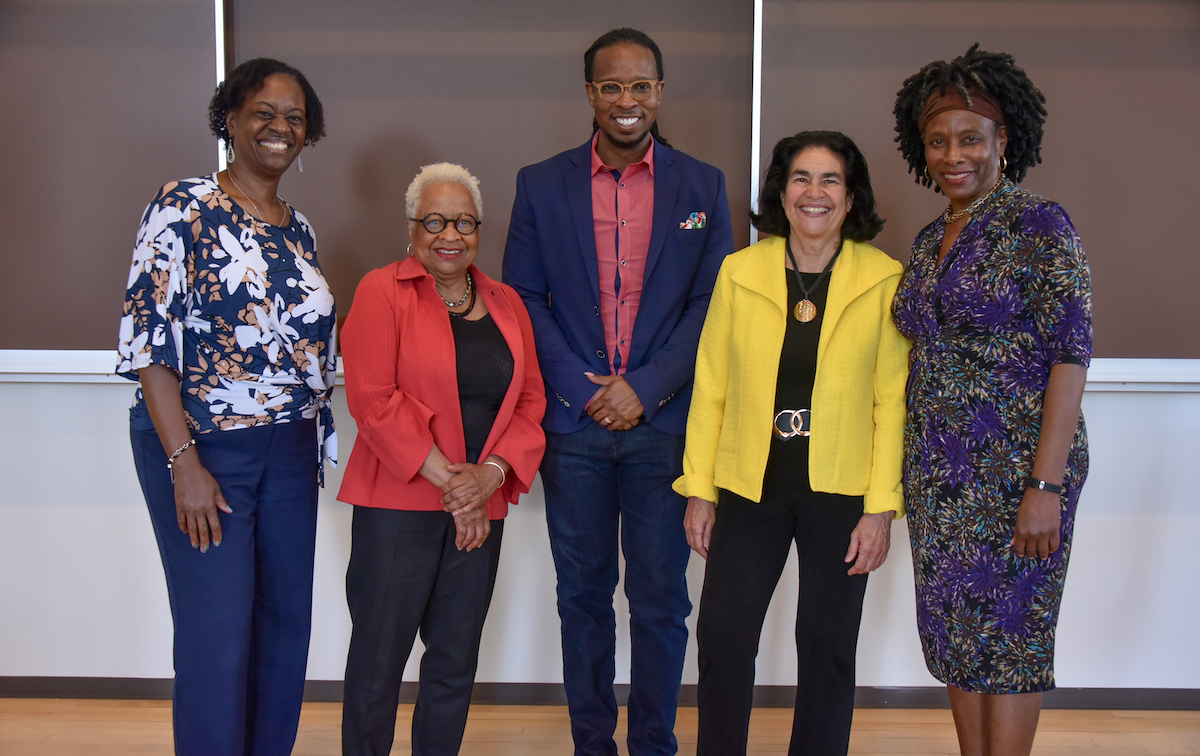Racial Justice Law Centers Gather to Learn and Strategize at CLEAR Conference


06.02.23 — Law center representatives from across the country gathered to learn from each other and strategize at Imperiled Democracy: The Unfinished Promise of Democracy and the Role of Racial Justice Centers, a conference hosted by the Center for Law, Equity and Race (CLEAR) at Northeastern University School of Law, on June 1 and 2, 2023.
Eleven law schools, including Northeastern, participated in the conference. Together, they shared their work and discussed the challenges they face while creating change in a fraught political climate.
In a fireside chat, Professor Margaret Burnham, director of the Civil Rights and Restorative Justice Project and faculty co-director of CLEAR, opened the conference by outlining what this political reality looks like. As she noted, at the beginning of the century dangerous fascist rhetoric was unheard of in the political realm in the United States; now, it’s a reality. “It’s a direct threat that has seeped into every corner of our political space,” Burnham said. “The potential for fascism looms large.”
At the same time, she said, anti-racist centers would not exist without the progressive responses to that threat, referencing the protests in response to the murders of George Floyd, Breonna Taylor and Trayvon Martin.
“It is a moment of deep threat, but also a moment of enormous possibility,” Burnham said. “I don’t think this is a moment. I think this is our future, that our future will be defined by deep and lasting contestation over racism, gender discrimination, attacks on women and climate justice.”
Rahsaan Hall ’98, president and CEO of the Urban League of Eastern Massachusetts, agreed with Burnham, and began by noting that the backlash of white supremacy is a response to the nation becoming more diverse.
“White male hetero patriarchy as the identity of America and what America is, is coming under attack from some people’s perspective,” he said. “The initiatives that we see politically are an attempt to hold onto that identity.”
What is the role of an anti-racist center in this climate? Centers need to train the next generation of anti-racist lawyers, Burnham said. They need to form relationships with progressive anti-racist movements to make the most impact in their local communities. Burnham and Hall spoke about the role of a center that is based in another institution, partnerships with communities and community organizations, and making their work accessible to the general public.
Professor Katheryn Russell Brown, director of the Race and Crime Center for Justice at the University of Florida Levin College of Law, spoke about the challenges faced by the over 100 race centers on college campuses in America, along with featured speaker Ibram X. Kendi, director and founder of the Center for Antiracist Research at Boston University.
Together, they discussed the sustainability of their work in a changing world, keeping their work going in institutions with changing administrations, and obtaining funding outside of institutions.
“To me, the best way to sustain our work is through ensuring that our centers are not sustained through the whims of those administrators,” Kendi said.
He also spoke about the importance of working together with other race centers, and of centers having a specialized mission that reflects the needs of the community, which may be wary of an institution with a history of exploitation.
The conference continued with a round table discussion in which five center representatives shared their work, as well as the challenges they face.
Robert S. Chang, professor of law and executive director at the Fred T. Korematsu Center for Law and Equality at the Seattle University School of Law, talked about his work in the incarceration system and the education system, and the challenges of being given resources that can then be taken away. Still, he said, “don’t be afraid to just go out and do this work.”
Jason D. Williamson, executive director of the Center on Race, Inequality, and the Law at the NYU School of Law, works on criminal justice and public defense reform, and spoke about the challenge of overcoming institutional history. LaToya Baldwin Clark, assistant professor of law at the Critical Race Studies Program at the UCLA Law School, spoke about her work responding to attacks on critical race theory.
Alora Thomas-Lundborg, strategic litigation and advocacy director of the Charles Hamilton Houston Institute for Race & Justice at the Harvard Law School, talked about the relaunch of the center at Harvard and their work on voting rights. “We’re thinking about other ways of doing democracy,” she said.
Ada Goodly Lampkin, director of the Louis A. Berry Institute for Civil Rights and Justice at the Southern University Law Center, faces the challenge of creating change in a red state. “We need to be watchdogs for these bad bills that will possibly become law, especially in Louisiana, where we’re bleeding red,” she said.
Professor Deborah Ramirez, director of Northeastern Law’s Criminal Justice Task Force and faculty co-director of CLEAR, made closing remarks reminding attendees of what is at stake in their work. “The threat of fascism … that threat has manifested itself with a deep hatred for the marginalized, for the poor, for the BIPOC community,” she said.
The conference ended with remarks from Deborah A. Jackson, managing director of the Center for Law, Equity and Race (CLEAR). She expressed thanks to the participants for their contributions to the important dialogue and stressed the need to find ways to work together to address the issues confronting racial justice centers.
Watch Day 1 of the CLEAR Conference
Watch Day 2 of the CLEAR Conference